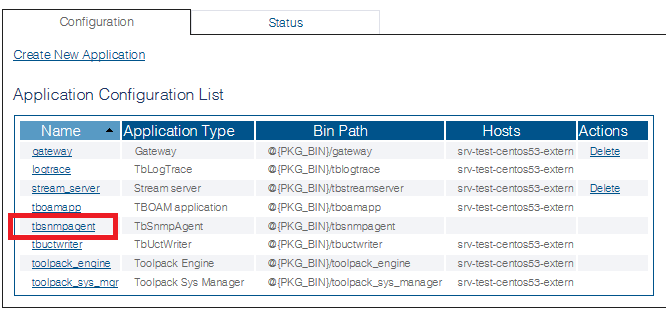Toolpack:Configuring tbSnmpAgent B
From TBwiki
(Difference between revisions)
(New 2.8 article) |
(added liks to missing parameters) |
||
| (23 intermediate revisions by one user not shown) | |||
| Line 2: | Line 2: | ||
{{DISPLAYTITLE:Configuring the SNMP Agent}} | {{DISPLAYTITLE:Configuring the SNMP Agent}} | ||
| − | Once you | + | Once you have successfully activated the tbSnmpAgent application, follow these steps to configure the SNMP system parameters: |
| − | + | ||
| − | + | ||
| − | [[ | + | 1) Click '''Applications''' in the navigation panel. |
| + | |||
| + | [[Image:Snmp_cfg_0.png]] | ||
<br/><br/> | <br/><br/> | ||
| − | + | 2) In the '''Application Configuration List''', select '''tbsnmpagent'''. | |
| − | [[ | + | |
| + | [[Image:Snmp_cfg_1.png]] | ||
<br/><br/> | <br/><br/> | ||
| − | < | + | 3) Click '''Application Params''' |
| + | |||
| + | [[Image:Snmp_cfg_2.png]] | ||
| + | <br/><br/> | ||
| + | 4) Enter values for the following parameters: | ||
| + | *'''SNMP IP Port''': The '''IP port''' to use for making SNMP requests (standard default value is 161). | ||
| + | *'''SNMP System Description''': The textual description that will appear when polling the '''sysDescr''' variable of the SNMPv2-MIB. | ||
| + | *'''SNMP System Object ID''': The value appended to TelcoBridges' value (.1.3.6.1.4.1.21776.3) for the SNMPv2-MIB variable '''sysObjectId'''**SNMP System Name: the textual description that will appear when polling the '''sysName''' variable of the SNMPv2-MIB. | ||
| + | *'''SNMP System Location''': The textual description that will appear when polling the '''sysLocation''' variable of the SNMPv2-MIB. | ||
| + | *'''SNMP System Contact''': The textual description that will appear when polling the '''sysContact''' variable of the SNMPv2-MIB.<br/><br/> | ||
| + | [[Image:Snmp_cfg_3.png]] | ||
| + | <br/><br/> | ||
| + | 5) Click '''Advanced Params''' to view or change advanced settings for the following parameter(s): | ||
| + | *'''Polling delay to generate traps''': Sets the length (in seconds) for the time intervals at which the SNMP agent polls for newly generated traps. | ||
| + | *'''Use system names''': Indicates that SNMP uses the names interfaces of the system instead of the names interfaces generated by adapters. | ||
| + | |||
| + | [[Image:Snmp_cfg_4.png]] | ||
| + | <br/><br/> | ||
| + | *Click '''Save''' | ||
| + | |||
| + | [[Image:Snmp_cfg_5.png]] | ||
| + | <br/><br/> | ||
| + | 6) Verify that the '''ApplicationCfg was sucessfully updated''' message is displayed. | ||
| + | |||
| + | [[Image:Snmp_cfg_6.png]] | ||
| + | |||
| + | ==List of Parameters== | ||
| + | |||
| + | * [[Parameter: Application Type|Application Type]] | ||
| + | * [[Parameter: Name|Name]] | ||
| + | * [[Parameter: Bin Path|Bin Path]] | ||
| + | * [[Parameter: Location|Location]] | ||
| + | * [[Parameter: Working Path|Working Path]] | ||
| + | * [[Parameter: Commadn-line arguments|Command-line arguments]] | ||
| + | |||
| + | <br> | ||
| + | |||
| + | <div class="mw-collapsible mw-collapsed" data-collapsetext="Application Parameters" data-expandtext="Application Parameters" style="width: 400px;"> | ||
| + | {| class="wikitable" | ||
| + | |- | ||
| + | * [[Parameter: SNMP IP port|SNMP IP port]] | ||
| + | * [[Parameter: SNMP System Description|SNMP System Description]] | ||
| + | * [[Parameter: SNMP System Object ID|SNMP System Object ID]] | ||
| + | * [[Parameter: SNMP System Name|SNMP System Name]] | ||
| + | * [[Parameter: SNMP System Location|SNMP System Location]] | ||
| + | * [[Parameter: SNMP System Contact|SNMP System Contact]] | ||
| − | + | * Advanced SNMP Parameters | |
| − | + | ** [[Parameter: Polling delay to generate Traps|Polling delay to generate Traps]] | |
| − | + | ** [[Parameter: Use system names|Use system names]] | |
| − | + | ||
| − | + | ||
| − | + | ||
| − | + | ||
| − | + | ||
| − | + | ||
| − | + | |} | |
| − | + | </div> | |
| − | + | ||
| − | + | ||
| − | == | + | <br> |
| + | <div class="mw-collapsible mw-collapsed" data-collapsetext="Advanced Parameters" data-expandtext="Advanced Parameters" style="width: 400px;"> | ||
| + | {| class="wikitable" | ||
| + | |- | ||
| + | * Log Parameters | ||
| + | ** [[Parameter: Default Trace Level|Default Trace Level]] | ||
| + | ** [[Parameter: Log File Path|Log File Path]] | ||
| + | ** [[Parameter: Max Log File Segment Size|Max Log File Segment Size]] | ||
| + | ** [[Parameter: Max Total Gzipped Log Files Size|Max Total Gzipped Log Files Size]] | ||
| − | + | * Network Lib Parameters | |
| − | + | ** [[Parameter: Network Polling Delay|Network Polling Delay]] | |
| − | + | ** [[Parameter: Network Switchover Delay|Network Switchover Delay]] | |
| + | ** [[Parameter: Communication Down Delay|Communication Down Delay]] | ||
| − | + | |} | |
| + | </div> | ||
| − | + | <br> | |
| − | + | ||
| − | + | ||
| − | + | ||
| − | + | ||
| − | + | ||
| − | + | ||
Latest revision as of 12:00, 9 June 2015
Applies to version(s): v2.8.
Once you have successfully activated the tbSnmpAgent application, follow these steps to configure the SNMP system parameters:
1) Click Applications in the navigation panel.
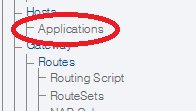
2) In the Application Configuration List, select tbsnmpagent.
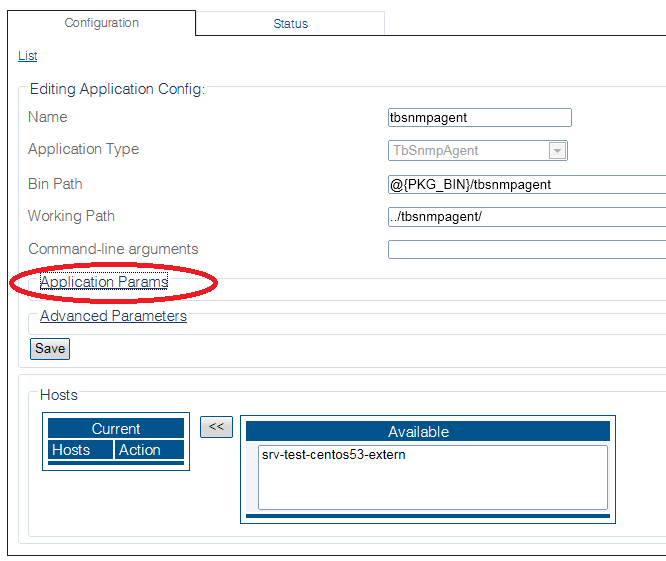
4) Enter values for the following parameters:
- SNMP IP Port: The IP port to use for making SNMP requests (standard default value is 161).
- SNMP System Description: The textual description that will appear when polling the sysDescr variable of the SNMPv2-MIB.
- SNMP System Object ID: The value appended to TelcoBridges' value (.1.3.6.1.4.1.21776.3) for the SNMPv2-MIB variable sysObjectId**SNMP System Name: the textual description that will appear when polling the sysName variable of the SNMPv2-MIB.
- SNMP System Location: The textual description that will appear when polling the sysLocation variable of the SNMPv2-MIB.
- SNMP System Contact: The textual description that will appear when polling the sysContact variable of the SNMPv2-MIB.
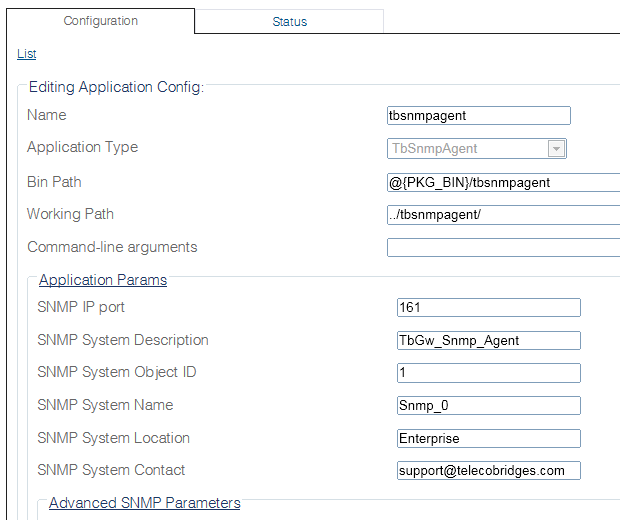
5) Click Advanced Params to view or change advanced settings for the following parameter(s):
- Polling delay to generate traps: Sets the length (in seconds) for the time intervals at which the SNMP agent polls for newly generated traps.
- Use system names: Indicates that SNMP uses the names interfaces of the system instead of the names interfaces generated by adapters.
- Click Save
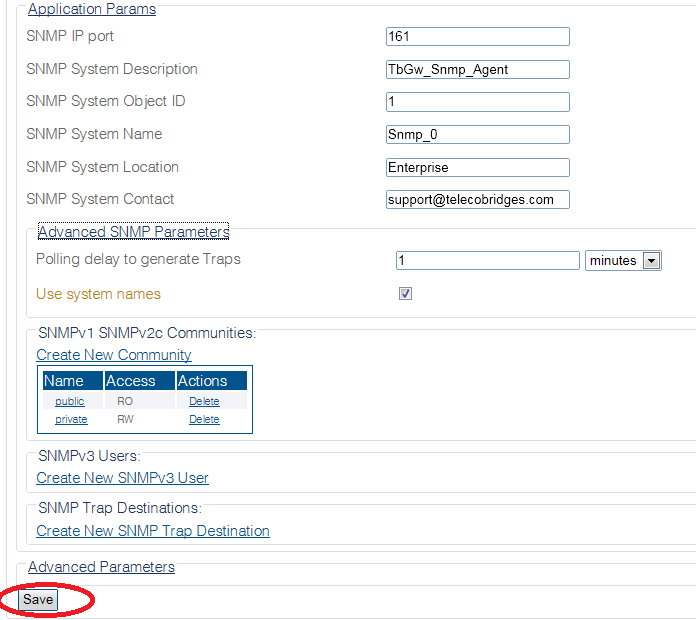
6) Verify that the ApplicationCfg was sucessfully updated message is displayed.
List of Parameters
